Do you ever feel overwhelmed and incapable of making decisions when you are drowning in a sea of options? This is known as analysis paralysis. But what causes analysis paralysis and how to overcome analysis paralysis? Let us shed some light on this common cognitive trap.
What is analysis paralysis?
Analysis paralysis meaning: Analysis paralysis is a state of overthinking or over-analyzing a situation to the point where a decision is delayed or cannot be made at all.
According to analysis paralysis psychology, when faced with multiple options and choices, most people tend to analyze and research excessively in an attempt to make the “perfect” choice.
However, the multitude of options can lead to a complex decision making problem causing them to become overwhelmed and unable to make a choice. This leads to increased stress, confusion, procrastination and potential loss of opportunities.
Analysis paralysis symptoms
How can you know if you are suffering from analysis paralysis? Here are some of the most common analysis paralysis symptoms that you should know about –
- You may procrastinate and delay making a decision or taking an action due to overthinking.
- You may constantly research and gather data but fail to make any progress towards making a decision.
- You may be indecisive and struggle to make a choice, even when presented with a limited number of options.
- You may become stuck in a cycle of overthinking and over-analyzing a situation, leading to a lack of progress.
- You may experience anxiety as you may constantly worry about making the wrong decision.
- You may feel drained, stressed, and exhausted from the decision.
- You may experience regret after making a decision due to the fear of making the wrong choice.
- You may miss deadlines and opportunities due to inability to choose in time.
Related: 8 Signs You’re An Overthinker (Even If You Don’t Think You Are!)
What causes analysis paralysis?
Analysis paralysis can be caused by multiple factors, including the following –
1. Fear of making the wrong decision
Fear of not making the best or right decision can cause individuals to become stuck in a cycle of analyzing all the available options and potential outcomes, leading to indecision.
2. Desire for the perfect solution
People who have a perfectionist mindset may struggle with analysis paralysis as they strive to make the perfect decision. This can lead to an over-analysis of the situation and an inability to make a choice.
Striving for the absolute best while rejecting good enough choices means analysis continues endlessly. This quest for flawlessness is what causes analysis paralysis.
3. Lack of Information
When someone feels that they do not have enough information to make an informed decision, they may become stuck in a cycle of seeking more information, leading to analysis paralysis.
4. Too much information
Constrarily, availability of excessive information can also be a factor. In the age of information, data is easily accessible which makes researching options effortless.
However, this abundant information only adds to the analysis without helping make a decision. This is what causes analysis paralysis.
5. Overwhelm
A complex problem or a multitude of options can be overwhelming, causing a person to become paralyzed with indecision.
6. Anxiety
Individuals who struggle with anxiety may find it difficult to make decisions, leading to analysis paralysis.
7. Decision fatigue
Making too many decisions in a short period of time can lead to decision fatigue, causing someone to become tired and unable to make further decisions.
Related: The Burden Of Intelligence: 7 Downsides of High IQ

Analysis paralysis vs choice paralysis
In the realm of decision-making, two formidable foes often rear their heads: analysis paralysis and choice paralysis. While they may seem like two sides of the same coin, there are nuanced differences between them.
Analysis paralysis arises from excessive contemplation and information overload, while choice paralysis stems from an abundance of options.
Option or choice paralysis is a type of analysis paralysis where too many options themselves cause indecision. The more alternatives there are, the harder it is to decide. This can lead to a feeling of overwhelm and an inability to make a decision.
Choice paralysis can occur in various areas of life, including career choices, relationships, and consumer decisions.
How to overcome analysis paralysis
Overcoming analysis paralysis requires a conscious effort to break the cycle of overthinking and indecision. Here are some strategies that can help to beat what causes analysis paralysis –
1. Set limits
Restrict the amount of time you spend analyzing a situation or making a decision. Set a deadline for yourself and commit to making a choice by that time.
2. Prioritize
Identify the most important factors that need to be considered in making a decision and prioritize them. This will help to narrow down the options and make the decision-making process more practical and doable.
Related: How Overthinking Affects Your Life (and 6 Ways To Stop)
3. Seek advice
Reach out to trusted loved ones like parents or a romantic partner for advice and guidance. This can help provide a fresh perspective and new insights on the situation.
4. Take action
Sometimes, the best way to overcome analysis paralysis is to take action. Start with a small step towards your goal, and momentum will build from there.
5. Practice mindfulness
Mindfulness practices, such as meditation and deep breathing, can help to calm the mind and reduce anxiety, making it easier to make decisions.
Still wondering how to overcome analysis paralysis? Here are some other quick tips –
- Consult experts: Talk to people knowledgeable in the area to gain real-world perspective.
- Make a pros/cons list: Weigh the pros and cons to see actual differences between options.
- Start with good enough: Aim for a satisfactory choice rather than a perfect one.
- Try, track and tweak: Make an initial choice, monitor progress, and adjust if needed later.
Stop overthinking, start deciding
Analysis paralysis is a common phenomenon that can occur when faced with complex problems or a multitude of options. Understanding what causes analysis paralysis and the symptoms is the first step in overcoming it.
Remember that no decision will ever be 100% satisfactory. Move past endless analysis, accept imperfections and take action.
By setting limits, prioritizing, seeking advice, taking action, and practicing mindfulness, you can break the cycle of overthinking and indecision, and move forward towards your goals with confidence.
Related: 11 Mental Tricks To STOP Overthinking










Leave a Reply